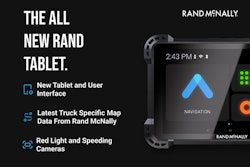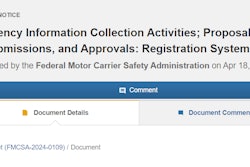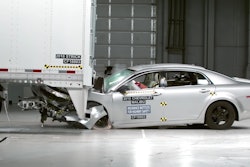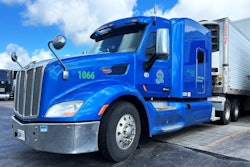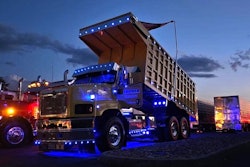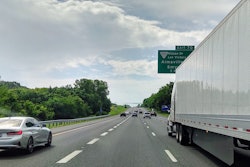Trucking news and briefs for Thursday, June 27, 2024:
Another day, another funding bill with potential to rein in contracting rules
Appropriations action for fiscal year 2025 continued Thursday with the House Appropriations Labor, Health and Human Services, Education, and Related Agencies Subcommittee approving a bill setting funding levels for covered departments for next year.
Among provisions in the bill is one that would prohibit the Department of Labor from implementing its independent contractor rule, which was finalized and took effect earlier this year.
As previously reported, the rule codified a six-factor test for determining employee/independent contractor status under the Fair Labor Standards Act.
Greg Feary, president and managing partner of transportation law firm Scopelitis, said such a test is a “multi-factor balancing test” -- if more factors lean toward one classification over the other, that’s the result of the test. That’s considerably different from an "ABC test," as seen in California with its AB 5 law, where if you fail to meet any one of the three factors, the worker is an employee.
[Related: Are leased owner-operators really 'independent contractors'?]
The six factors in the new DOL rule:
- Opportunity for profit or loss depending on managerial skill
- Investments by the worker and the potential employer
- Degree of permanence of the work relationship
- Nature and degree of control
- Extent to which the work performed is an integral part of the potential employer’s business
- Skill and initiative
The rule has been under scrutiny from members of Congress and the trucking industry. The American Trucking Associations is among a coalition of groups suing DOL over the rule.
“When the U.S. Department of Labor replaced a straightforward definition for independent contractors with an opaque and deliberately confusing standard, it jeopardized the livelihoods of independent truckers nationwide who have spent years or even decades building their own small businesses,” said ATA President & CEO Chris Spear.
Spear added that halting the implementation of the rule “would respect the wishes of more than 350,000 truckers who select this employment path because of the economic opportunity it creates and the flexibility it provides.”
The appropriations bill now advances to the full House Appropriations Committee. It will need to pass at the committee level, then pass the full House and the Senate, before heading to the President’s desk to be signed into law.
[Related: DOL’s final independent contractor rule under fire from Congress, lawsuit]
Uber Freight partners with another autonomous truck developer
The Uber Freight brokerage announced this week it is partnering with autonomous truck developer Aurora Innovation to launch Premier Autonomy, a program that aspires to allow carriers within the Uber Freight system to purchase and onboard autonomous trucks.
The companies claim the new program will “enable carriers to improve utilization and enhance business efficiency through autonomous technologies.”
Additionally, Uber Freight will be one of Aurora's first customers on its Dallas-to-Houston freight route, with "driverless" hauls for shippers expected at the end of 2024, the companies said. Though in a press release announcing the partnership, the companies caution that there are risks and uncertainties that could result in different outcomes and timelines than currently anticipated.
“Uber Freight and Aurora see a tremendous opportunity to democratize autonomous trucks for carriers of all sizes, enabling them to drive more revenue, scale their fleets, and strengthen their bottom lines,” said Lior Ron, founder and CEO of Uber Freight, adding he believes auto-trucks “will make moving goods more efficient" and aims to accelerate deployment of such vehicles.
Aurora is Uber Freight’s second autonomous partnership. The company in 2022 announced it was working with Volvo Autonomous Solutions to deploy Volvo’s autonomous tech in its network.
Uber Freight and Aurora said their new Premier Autonomy program will offer carriers:
- Subscription to the Aurora Driver autonomous system for autonomous freight hauling
- Opportunity to access an estimated 1 billion "driverless" miles, the company said, through 2030
- High utilization of autonomous trucks via a planned integration of the Aurora Driver into the Uber Freight platform
Uber Freight and Aurora said they've hauled millions of pounds of cargo together since autonomous pilot moves began in 2020.
Interested carriers can join a waitlist for the Premier Autonomy program here.
[Related: An 'autonomous trap': The limits of technology, illustrated]
FMCSA provisionally renews brake-light waiver for tanker fleet
Groendyke Transport will be allowed to continue using an amber brake-activated pulsating lamp on the rear of its trailers in addition to the steady-burning brake lamps required by the Federal Motor Carrier Safety Regulations (FMCSRs) following the provisional renewal of an exemption by the Federal Motor Carrier Safety Administration.
The FMCSRs require all exterior lamps to be steady-burning except turn signal lamps, hazard warning signal lamps, school bus warning lamps, amber warning lamps or flashing warning lamps on tow trucks and commercial motor vehicles transporting oversized loads, likewise warning lamps on emergency and service vehicles authorized by state or local authorities.
FMCSA in 2019 granted an exemption to Groendyke to allow the use of pulsating amber brake-activated lights to increase visibility of its approximately 1,440 tanker trailers hauling hazardous materials.
In applying for a renewal of the five-year exemption, Groendyke reported a notable reduction in rear-end accidents since the waiver was granted.
The provisional renewal is effective for 6 months, retroactive to April 26, 2024, through Oct. 26, 2024. If no evidence of insufficient safety is provided to the agency, FMCSA said it anticipates granting a full five-year exemption when the provisional exemption expires.
A separate waiver granted to the National Tank Truck Carriers group in 2020 allows any fleet to install a red or amber brake-activated pulsating lamp in the upper center position or in an upper dual outboard position on the back of tanker trailers, in addition to the steady-burning brake lamps required by the FMCSRs.
[Related: Large fleet gets waiver to install pulsating brake lights on back of tankers]
Four fleets get waiver for Intellistop brake light module
The Federal Motor Carrier Safety Administration is granting waivers to four fleets to allow the use of the Intellistop module, which pulses the brake lights when brakes are applied.
Fleets receiving the waiver are:
- Brent Higgins Trucking Inc. (29 trucks)
- DJS Fundraising (5 trucks)
- JM Bozeman Enterprises (223 trucks)
- Meiborg Brothers Inc. (170 trucks)
FMCSA recently granted an exemption to Gemini Motor Transport, the fuel transport arm of Love’s Travel Stops, to allow the fleet to use the Intellistop module.
The Intellistop module pulses the required rear clearance, identification, and brake lamps from a lower-level lighting intensity to a higher-level lighting intensity four times in two seconds when the brakes are applied and then return the lights to a steady-burning state while the brakes remain engaged.
As previously reported, FMCSA denied an industry-wide exemption to allow all interstate motor carriers to operate CMVs equipped with the Intellistop module, but encouraged individual fleets to apply for a waiver to use the module. “Exemptions more limited in scope would allow the agency to ensure compliance with all relevant FMCSA regulations because the individual exemptee would be easily identifiable and its compliance with applicable regulations could be monitored,” FMCSA said.
All four fleets’ waivers are effective for five years through June 28, 2029.
[Related: FMCSA to allow tanker fleet to use certain pulsating brake light module]
